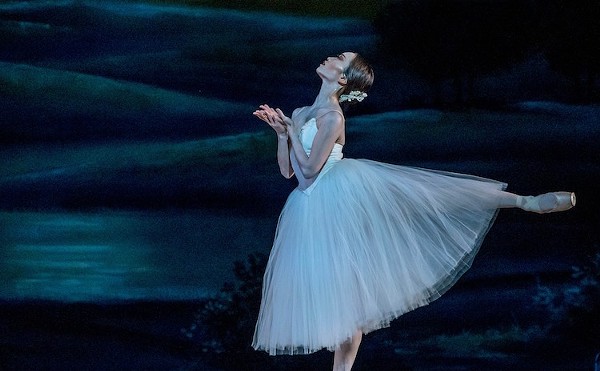Ken Burns sounds like nothing if not an evangelist as he waxes lyrical about "Jazz," the lovingly assembled 10-part series that debuts at 9 p.m. Jan. 8 on WMFE Channel 24. The celebrated filmmaker, whose previous "The Civil War" and "Baseball" documentaries drew a cumulative audience of about 85 million viewers, is on a mission from God -- or maybe from newfound personal hero Louis Armstrong -- to spread his gospel.
Months of lectures and seminars have yet to diminish Burns' missionarylike zeal for the subject. He's a tireless promoter of the endeavor, a $13 million project six years in the making.
"I've had reporters tell me how enthusiastic I am," Burns, 47, says by telephone from his office in tiny Walpole, N.H. "‘Enthusiasm' means ‘God in us.' So there is an evangelical dimension ... After "The Civil War," battlefield attendance spiked 200 to 300 percent at Gettysburg and places like that. It's had a huge profound effect, that series, and it's gratifying. I hope something similar happens with "Jazz."
"Clearly jazz, for whatever reason, has been crowded out by other popular forms that owe their existence to jazz but have no memory of the form themselves. I find it incumbent upon jazz to tell its story so people can understand the way so many other forms grew out of it. Jazz is a mirror of where we've been."
Burns' passion may be so palpable because his conversion, if you will, was so recent. Before he embarked on "Jazz," the former record-store clerk owned fewer than 10 jazz albums, expected classics by Miles Davis, John Coltrane and others. "I owned a handful," he says. "But I haven't known about any of the subjects I've done `before beginning the research`. I make these films to share with the world what I discover."
His journey into the world of Armstrong, Davis, Coltrane, Sidney Bechet, Dizzy Gillespie, Charlie Parker and others began during a "Baseball" interview with writer Gerald Early. "He said that 2,000 years from now, America will be known for only three things: the Constitution, baseball and jazz music. I realized that I was now involved in a trilogy of American life."
Burns, in an effort to make sure that Jazz reaches the greatest number of viewers, has jump-started the publicity machine with a variety of tie-in products. The companion five-CD box set debuted at No. 2 on the "Billboard" jazz chart in November. There's also a 20-track single CD of music from the series; a $65 book, "Jazz: A History of America's Music"; a $200 DVD boxed set; and 22 best-of collections devoted to various greats.
That's not all. The sound of Jazz will be heard in 3,000 Starbucks stores, which will sell the sampler and give a portion of the proceeds to the United Negro College Fund. The National Basketball Association is also getting into the act, with affiliated television promos and jazz at halftime shows.
"Jazz", in short, will be everywhere. And that's a good thing, for the most part: Burns successfully conveys a message about the depth and sheer exuberance of an art form with roots, as explained in the opening segment, in the singing, dancing and percussion playing of freed African and West Indian slaves in New Orleans.
"Jazz music celebrates life, human life," opines Wynton Marsalis, the series' valuable if annoyingly ubiquitous chief creative consultant. (Far too few old-timers are included). "It's the ultimate in rugged individualism," adds critic Gary Giddins, an occasional adversary of Marsalis' classicism-is-everything philosophy. And we hear from writer Albert Murray: "It's the creative process incarnate."
"Jazz" admirably gets at the artistic process, demonstrating influences and allowing Marsalis to pick up his horn and provide an analysis of Armstrong's "West End Blues" and other tunes.
The filmmaker, too, ably weaves in historical events, discussing the impact of the slave trade, the Civil War, the migration of African Americans to Chicago, the Harlem Renaissance, Prohibition, the two World Wars, the Depression and civil-rights.
The numerous anecdotes, including the story of how Bessie Smith frightened away a half-dozen Klansmen threatening to disturb a concert, are entertaining and disturbing, sometimes simultaneously. And Burns manages to make even the most familiar biographies refreshing.
There has already been criticism from afficionados, first that Marsalis' specific ideas about the relationship between today's performers and the music of the past have been allowed to dominate the series. "I don't give him space to espouse his philosophy," Burns counters. "His controversial nature is in large measure due to the jealousy people feel about his central position `in the industry`."
Related to that charge is the claim that Burns gives far too little attention to the developments of the last 25 years. Free jazz, avant-garde explorations, fusion and hip-hop collaborations are given about an hour of time.
But Burns has a ready answer. "I'm in the business of history -- something that's been done and it's over. I couldn't presumably tell the present what it's about." And furthermore: "Who among today's players are on a par with Armstrong, Ellington, Miles Davis or John Coltrane?"
















